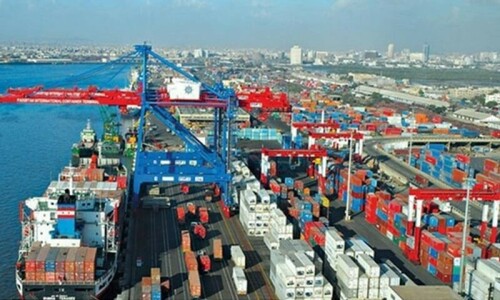
SINDH seems determined to pursue a regressive provincial taxation policy with 91.9pc of its tax revenues collected through indirect taxes. Bulk of it — Rs61bn — comes from sales tax on services.
An essentially centralised taxation and distribution system does not leave much space for the provincial government to set the policy direction to ultimately hit, with notable speed, the right mix between and direct and indirect taxes.
However, its dismal performance in collecting tax on farm incomes lends support to the belief that it is more an issue of strong political will rather than anything else. It may, however, be conceded that the sway of landed gentry over much of the countryside including the revenue collection agency makes it all the more difficult to remove the administrative bottlenecks. In sharp contrast, Sindh has outperformed the Federal Board of Revenue in collecting sales tax on services from urban areas once it was transferred to the provinces. It did some good pioneering work.
The PPP, which has always worked for a more equitable distribution of the tax revenue/resources between the federation and the provinces, is shying away from a fair taxation policy within the province it has ruled for the last eight years
But that kind of efficiency is not evident in taxing rural incomes by a provincial government headed by agriculturalists. It was revealed in the Sindh assembly that only 18pc landlords paid agricultural income tax (AIT) during 2012-13. The latest figures were not given, raising the fear that the final collection since then may have further decelerated. Going by the AIT collection of Rs102.6m in that year, the target set at Rs559.3m for 2015-16 would appear to be pretty ambitious. Yet the AIT target for this year is a mere 0.4pc of the total estimated provincial revenue and definitely much less than the open and hidden subsidies for the agricultural sector.
One may not grudge the subsidy that is imperative to lift the farm economy out of the woods but the big farmers need to pay income tax to share the bill for the uplift of agriculture. The option of low rate of land tax must go. It is surprising that the PPP, which distinguished itself by adopting a progressive taxation policy for a more equitable distribution of the tax revenue/resources between the federation and the provinces, is shying away from a fair taxation policy within the province it has ruled for the last eight years. It is a long time to make a difference. In this process the PPP’s image of being a progressive party is fading away. When in power, PPP founder Zulfikar Ali Bhutto had proposed the AIT and also introduced land reforms. The present PPP government in Sindh cannot resolve problems to resume distribution of state lands among the poor peasants. It is no wonder that NGOs are now building the pressure for land reforms.
Like other provinces having failed to meet their obligation to raise tax revenues as stipulated in the 7th NFC award, Sindh has landed into a federal trap. It has to produce budget surpluses to help the federation manage the required fiscal consolidation. Of course a part of the blame may be fairly apportioned to lower than targeted revenue share of the provinces from the federal divisible pool and in the Sindh’s case particularly to poor governance. The price of all this is being paid in the form of smaller development budgets by a vast majority of people in rural areas living in stark poverty.
It can be argued that agriculture has suffered over decades and this suffering has not gone away despite the liberal support prices for the wheat (staple) and sugarcane (cash) crops; one can see the unabated transfer of resources from rural to urban areas in the exchange of high priced farm inputs with low priced crops. This needs to be checked.
But at the end of the day, big farmers tend to make big money as demonstrated by their luxurious life style visible in major cities. They need to pay taxes and should shoulder this responsibility with grace in their own enlightened interest.
Sindh’s agriculture needs a lot of investment in farm modernisation, (moving from pre-industrial to post-industrial management and technology), repair of a depleted irrigation system, lining of canals, farm to market roads etc ‑ in short developing both social and physical infrastructure, and doing away with inefficient crop-sharing mode, at a speed much faster than at present to make rapid social progress. And all this with a view to develop both the rural and urban segments into an integrated provincial economy capable of progressing on its own steam and momentum.
One area that the landed gentry in Sindh has tended to ignore generally is rural industrialisation which can be cost effective due to proximity of raw materials of the factory location and lower wages of rural labour. The Sindh government needs to develop technical skills, particularly required for the induction of IT tools in agriculture. There is no escape from this ‘disruptive’ technology. it is question of time.
Published in Dawn, Business & Finance weekly, March 14th, 2016














































Dear visitor, the comments section is undergoing an overhaul and will return soon.